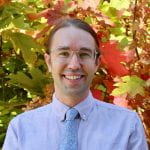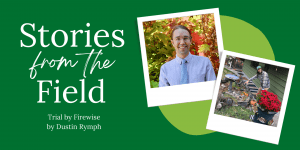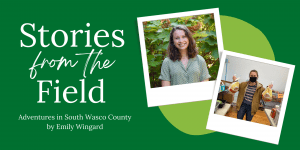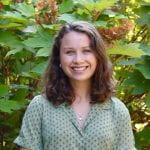By Dustin Rymph, Outreach Coordinator, Southern Willamette Forest Collaborative
Having just finished defending my Master’s thesis 30 minutes prior, and still feeling sore and sickly from my second Covid shot, I hopped in the car and made my way to the Community Wildfire Safety Night in Oakridge. I was not officially an AmeriCorps member at that point, but my soon-to-be supervisor wanted me to table at the event to get a taste of my prospective job as Outreach Coordinator. “These are the people you would be working with, and it’s important to meet them,” she told me. Still full of adrenaline from facing my thesis committee, the gorgeous landscape of the Willamette National Forest passing outside my window erased my soreness. It felt like I was driving from one phase of life to another. When I arrived, I was immediately placed behind a table, completely lacking knowledge of what I was supposed to say to attendees about fire. Still, when my future supervisor announced from the stage to the crowd that I even might be helping with fire mitigation next year, the crowd clapped, and one community member I already knew gave me a cheer.
Oakridge is like that, for the most part. People appreciate someone who is willing to do anything positive, and to work hard in the spirit of community. My job for the Southern Willamette Forest Collaborative (SWFC), part of which entails going onto strangers’ properties and delicately informing them of fire hazards, gets extra gratitude. This appreciation has been heightened by the fact that two wildfires came dangerously close to burning the city over the summer between the Wildfire Safety event in May and my position’s start date in September. I have frequently thought back to what one fire scientist had talked about on stage that night in May. He looked to the surrounding mountains, pointed out where historical fires had been, and explained how this foothills community, in an inevitable occurrence, is perfectly situated to be devastated by a catastrophic wildfire under current conditions. The community was saved in the summer of ‘21 only by the proactive lobbying of the National Forest staff for firefighting resources, as well as a stroke of luck.
The dry easterly winds that almost always blow during the summer didn’t occur, which would have pushed the nearby Kwis fire toward the population centers and overwhelmed fire crews. It has not been lost on me that this job, though a temporary position, comes at a crucial time in the fire history of Oakridge. We cannot prevent large wildfires, but we can do significant work to prevent loss of life and property. Fortunately, programs like Firewise, which is my main job activity (thanks to a grant worked on by my RARE predecessor Katie Fields), are based on scientifically-sound principles that anyone can follow to protect their homes and loved ones. Much like pandemic response, using people skills is more important than being a scientific expert when it comes to helping the public reduce risk. I have had to learn to actively listen without speaking and to be patient. This has meant sitting through hours of stories about people’s careers and struggles, or attentively watching as someone shows me how to work a knitting machine, or hearing someone tell me the decades of history behind every single ornamental plant on their property. Only after people feel heard are they usually receptive to hearing the uncomfortable truths about the little things that might make their homes safer in the event of an ember shower.
On one end of the scale, I have helped people pick out flame-resistant garden plants, install the right screens for their gable vents, and build less fire prone patios. On the other end we look at landscape-scale forest resiliency. At SWFC, we have had a quick turnaround as Oregon Senate Bill 762 has had its millions in fire mitigation funding come down rather confusingly and quickly. In a little over a month, we have gotten four requests for proposals from this bill alone and will have submitted six separate fire mitigation grant proposals to the state. This money, if approved, represents hundreds of project acres and around a million dollars in project costs that will go mostly to local crews. These projects would have an enormous impact on preparing the surrounding forests to have less severe wildfire, and would help create crucial lines of defense for the community. Of course, there’s no guarantee that we will get a penny of it. So, major grants or not, the best thing I can do is continue to listen to residents and help them to do the little things that might save their homes and belongings.
And hey, the more I get to learn about knitting machines and heirloom roses along the way, the better.
 About the author, Dustin Rymph: Dustin received his MS in Conflict Resolution with a Land Use Specialization from the University of Oregon in 2021. After graduating from the University of Nebraska with a Poli Sci degree in 2011, he spent the ensuing years working in Nebraska as a prairie ecologist, horticulturalist, market farmer, high school debate coach, and doing other odd jobs. His spare time is spent writing and playing music, foraging for wild plants, hiking with his partner, experimenting with fermentation, gardening, and hanging out with his Chihuahua.
About the author, Dustin Rymph: Dustin received his MS in Conflict Resolution with a Land Use Specialization from the University of Oregon in 2021. After graduating from the University of Nebraska with a Poli Sci degree in 2011, he spent the ensuing years working in Nebraska as a prairie ecologist, horticulturalist, market farmer, high school debate coach, and doing other odd jobs. His spare time is spent writing and playing music, foraging for wild plants, hiking with his partner, experimenting with fermentation, gardening, and hanging out with his Chihuahua.
Interested in gaining environmental and sustainability planning experience of your own? Are you looking for a life changing experience in rural Oregon? Learn more about serving with the RARE AmeriCorps Program. Applications for Year 29 (2022-23) due April 25, 2022 by 5pm PDT.


